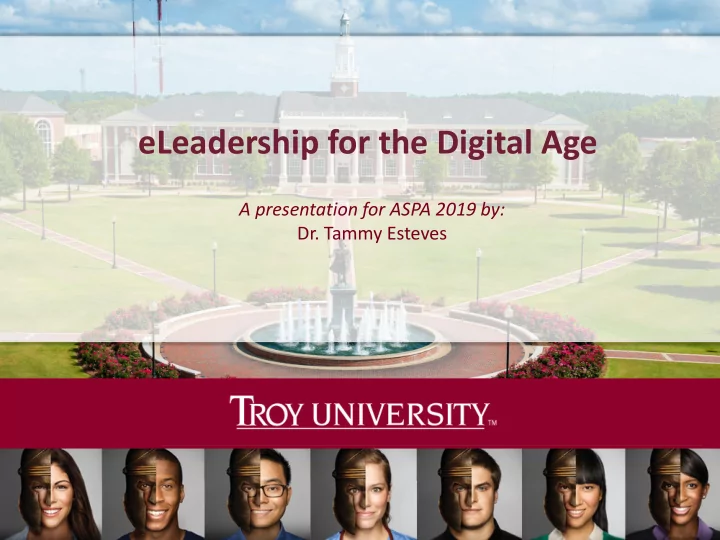

eLeadership for the Digital Age A presentation for ASPA 2019 by: Dr. Tammy Esteves
What is eLeadership? • Leadership over work that is remote, virtual, distributed, or mobile work, smartworking or workshifting. • Unique leadership challenges requiring appropriate communication tools, communicating expectations and goals, and connecting all members of the team.
Unique Challenges A survey of 58 senior executives in global companies found the following list of challenges commonly faced by virtual teams (Govindarajan and Gopta, 2001): • cultivating trust • overcoming lack of face-to-face contact / isolation • overcoming communication barriers • aligning goals of individual team members • obtaining clarity regarding team objectives • ensuring that the team possesses knowledge and skills • ensuring the availability of technology resources • dealing with role uncertainty
What are the new requirements for eLeadership? Are we preparing MPA students for eLeadership?
The required competencies will include five domains: ➢ the ability to lead and manage in public governance; ➢ to participate in and contribute to the policy process; ➢ to analyze, synthesize, think critically, solve problems and make decisions; ➢ to articulate and apply a public service perspective; ➢ to communicate and interact productively with a diverse and changing workforce and citizenry
Lead and manage … a diverse and changing workforce and citizenry • According to CNBC, in 2018, 170 companies in the U.S. operate 100% virtually (up from 26 in 2014). – Regular work-at-home, among the non-self-employed population , has grown by 140% since 2005, nearly 10x faster than the rest of the workforce or the self- employed. • 4.3 million employees (3.2% of the workforce) now work from home at least half the time.
Lead and manage … a diverse and changing workforce and citizenry • Changing citizenry • Social media • New careers • Chief Innovation Officer • Chief Technology Officer • Chief Information Officer
Ganapati & Reddick, JPAE (22:2, 2018) Four reasons: 1. IT is a large force reshaping the public sector - organizational management, new means of public engagement. 2. The use of IT in public organizations is rife with problems. 3. Without adequate IT training, our graduates will not be prepared for the modern workforce. 4. Important role that such programs play in society.
“A tech who happens to be administrator, or an administrator of the technologists?”
How did they get there? What are they looking for?
Critical thinking Systems thinking People skills Cultural competence “What is technologically possible may not be organizationally feasible, or socially or politically desireable .” (Teresa Pardo, Director Center for Technology in Government @ U Albany)
Preparing eLeaders In content In practice “Teach eLeadership by observing and then doing eLeadership ” (grad student Ricky)
Preparing eLeaders – In Content PA 6679 eGovernance course Topics: Growth of technology (incl relevant policy), eDemocracy, eServices, Social Media, CivicTech, Smart City Tech, Crowdsourcing, Big Data/Open Data, IoT, Ethical issues in eGovernance
Preparing eLeaders – In Practice Sway introductions Synchronous course orientation Virtual group work O365 collaboration (similar google docs) TEAMS OneNote Synchronous final presentations
Sway
OneNote for students
OneNote for faculty
TEAMS – Chat/Office Hours ❑ Chat/Office Hours ❑ Advising/Orientations ❑ Internships/Careers ❑ Group projects ❑ Classes
TEAMS – Advising/Orientations
TEAMS – Internships/Careers
TEAMS - Group projects
TEAMS - Classes
Contact Information Tammy Esteves tlesteves@troy.edu 407-313-0799 @tlesteves
Recommend
More recommend